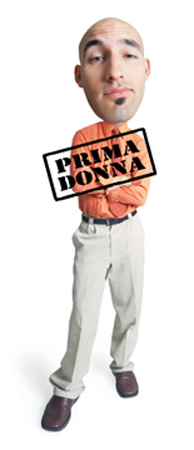


At what point does a healthy ego become disruptive to your business? While a good collision repair technician should be proud of the work he does, there are those who allow the quality of their repairs to go straight to their heads. Then again, there are others whose repair quality leaves a bit to be desired.
Many techs, regardless of the quality of their repairs, are more frequently taking advantage of the current shortage of techs available to replace them. Years ago, “prima donna” techs seemed much less common than they are these days. The occasional egomaniac would come along from time to time, but the availability of techs gave shop owners the leverage to deal with them. A shop owner could either bring the swelled ego down a notch or replace the tech.
Without such availability, however, many shop owners tolerate egos and behavior that were once considered intolerable in order to retain a full crew. Though many employers can’t stand having to give in to the techs on many issues, they do so in order to avoid lower production as well as the hassles of looking for a replacement if the tech leaves. The problem is that when the pushy technician gets his way on one particular issue, he’ll soon find another issue to take up with management.
While taking good care of your good techs is definitely good for business, every business owner must face the fact that there’s a point when you’re merely feeding an ego. When one or two employees have had their egos fed in this manner for an extended period of time, they can become rather difficult for everyone else to work with. And an employee with a swelled ego isn’t only difficult for you and your office staff to deal with. Your shop crew will experience difficulty in working alongside the prima donna as well.
Regardless of how the prima donna was created — maybe he was arrogant to begin with or management created him through preferential treatment — the fact is, you need to take steps to shrink his swollen head. Either that, or get used to shrinking profits.
Teamwork With a Customer Focus
One painter I worked with had a habit of telling the metal techs, “Your job is to make my job easy.” While I agree that a good metal tech should do the best work he can before sending it to the paint shop, I don’t feel that the metal tech should ever be treated as though he were hired to serve the painter. Likewise, painters should never be considered less important to the repair process. Because we’re all working in a service industry, we should consider it our job to serve our customers. Obviously, we can provide a much better service when we set our egos aside and concentrate on serving our customers.
who work well together can outperform a team of superstars with big egos.
In the ideal repair shop atmosphere, we should all work together to achieve certain common goals. What are some of those goals?
- We should all work together to repair the vehicles to the best of our abilities.
- We should all work together to generate the highest possible profit for the company.
- We should all work together to make as much money as we can for ourselves.
You’ll notice I said, “We should all work together.” I say this because teamwork is crucial to the success or failure of any business. You can have a team of superstars, each of whom is loaded with talent, but if they allow their egos to interfere with their ability to work with the team, none of the goals I mentioned will be attainable. A team of lesser-skilled people who work well together can easily outperform a team of superstars with big egos. I can remember times when Miami Dolphins quarterback Dan Marino set NFL league records, yet walked off the field on the losing team the same day. The Dolphins lost those games, not because of a lack of talent, but because the other teams did a better job of working together.
Favoring the “Old” Guys
The shortage of available techs certainly isn’t the only thing creating or feeding swelled egos. Some techs feel they’re above others simply because they’ve been in the same shop for a number of years and the boss caters to them a little more than the other techs. While I readily admit that the tech who’s devoted many years to an employer should be allowed a few perks that you might not offer the other techs, you can overdo a good thing and develop animosity between employees. When a two-year tech doing high-quality repairs is kept to a more strict set of rules or makes considerably less money than a 10-year tech doing mediocre repairs, the two-year tech often finds this treatment unfair.
Obviously, there are a lot of variables and each situation should be addressed individually. The two-year tech in this scenario may be less productive, but how much more productive would he be if he did the same mediocre repairs as the long-term tech? Is the two-year tech working on more older cars with used parts, while the senior tech is assigned newer vehicles with new parts? How much work space is each tech allowed? Is the same kind of shop equipment available to both techs? Most techs understand and accept the fact that a long-term employee will be somewhat better fed, but where do you draw the fine line between favoring a senior tech and feeding a prima donna?
What about two techs who were hired less than a year apart? Are you treating one tech a little better because he has similar interests to yours or maybe because he has a few beers with you after work? Maybe one tech buys you lunch from time to time, while the other goes home and has lunch with his wife every day. These are the issues that make body shop management such a tough balancing act, requiring you to study your own work habits the way you study the work habits of those in your employ.
It’s important for you as a business owner to constantly step back and look at the big picture to see if you’re overdoing a good thing. After all, you don’t want to lose good techs and good employees in an effort to keep one or two employees happy.
The “Honeymoon” Period
Likewise, you don’t want to over-feed the new employee’s ego either. I’ve seen this happen in many shops over the years, and it tends to alienate the new tech from the rest of your crew. One common cliché in our industry, “the honeymoon is over,” is often heard around the shop when the new tech starts getting the same treatment and the same job assignments as the other techs. I always know the honeymoon is over when I start getting some really hard-hit wrecks or maybe some older cars, either of which are to be repaired with a lot of used parts.
Nearly every shop owner tends to feed the lighter-hit, newer cars — the “gravy” jobs — to the recently hired tech. In fact, many techs don’t look forward to seeing a new tech start work in the shop because they expect to see less gravy work come their way for awhile.
New techs are so commonly catered to in my area, that I, as well as others, have often joked about moving from shop to shop, staying at each job only a few months. “If you’re always the new guy,” we say, “then the honeymoon never ends. When the boss stops romancing you, it’s time to move on to the next shop.”
Granted, it’s just talk, but let’s lay all jokes aside for a moment. If a commission-paid tech could stand to move his tools five times a year, would he actually make more money?
You can talk to techs anywhere in the country and most likely hear stories about shop owners who exercise selective assignment of work, selective enforcement of rules, etc. While it’s understandable that a shop owner can easily have a dozen different personalities to deal with (even though he might only have eight employees), you have to remember for the sake of fairness that any rule you bend for one tech is a rule you should be willing to bend for another tech.
We all know there will always be certain employees who always complain about things being unfair, but what if I surveyed collision techs nationwide? What percentage of the techs surveyed would say inequitable favoritism takes place in nearly every shop? And what percentage would also say that the boss’ favorite techs tend to be prima donnas?
Former co-worker Jay Eschelman once said, “Principles that originally made this country great should also apply to future great shops of this industry. What’s good for one is good for all.” Eschelman went on to explain how often he’s seen a shop owners’ fishing buddies attend a training session or frame class of some sort while a less-experienced, more-dedicated employee was overlooked.
When you have an opportunity to send one or two techs for training, do you apply the training where it’s needed most or do you send your favorite employees? The 30-year veteran who changes the oil in your wife’s car for free or buys you lunch once a week may not need the frame class as much as the five-year tech who’s been just as reliable and dependable as any employee you have. Send the five-year man to the class for the betterment of your business.
Where Do Prima Donnas Come From?
A wide variety of elements contribute to the creation of a prima-donna technician and regardless of which elements fueled the fire or the source of such elements, they all contribute to a reduction in teamwork within your shop. Communication lines break down when the majority of employees feel alienated by one or two techs and their swelled egos.
When one or two employees are singled out and placed on a pedestal, either by themselves or by the shop owner, the rest of the employees may tend to ignore them and/or avoid any confrontations with them. But when employees avoid inter-shop communications, shop production suffers.
Believe it or not, I’ve seen too many shop owners and managers tolerate a loss in production rather than confront a prima donna about his attitude toward his job or his co-workers. As difficult as it is to butt heads with and possibly lose a talented tech, you can’t continually overlook a swelled ego and expect it to go away.
But it’s not always techs who have prima-donna attitudes. I’ve known a few shop owners who were rather egomaniacal in the way they treated employees. I know of a few shops in my area where I never have and never will apply for a job, simply because of the reputations of the owners or managers. I’ve never felt I was doing anyone a favor by working in their shop and I’ve never cared for those shop owners who felt they were doing me a big favor either. The arrogant shop owner who talks down to his employees as though they’re below him tends to find himself at least one tech short of a full crew most of the time. While he tells himself, “Nobody wants to work anymore,” the plain and simple truth is nobody wants to work for an unappreciative employer anymore.
Pride is one of the seven deadly sins and it can consume any of us, but pride can also be a good thing. We should all do the very best work we can possibly do and we should be proud to do our best. When an employee does a job that you can be proud to deliver to your customer, you should show and tell your employee how proud you are.
Treat your employees as fairly and impartially as you possibly can. Treat them with the same respect you show your closest friends. Make them all feel appreciated and praise them for the work they do. But don’t overdo it.
Most importantly, be careful not to feed one or two employees’ egos too much or you’ll create a monster. And the worst thing about creating a monster is that you either have to feed it or kill it.
Writer Paul Bailey, a contributing editor to BodyShop Business, has been a collision repairman for 19 years and is an avid photographer and writer who maintains a consumer-awareness Web page in his spare time. He resides in Florida with his wife, Cathy. He can be reached by e-mail at [email protected].













